Two federal bills to protect children and teenagers’ online privacy were passed out of the U.S. Senate Committee on Commerce, Science and Transportation during a markup session July 27.
Committee members passed an update to the Children’s Online Privacy Protection Act with a voice vote carried by the Democratic majority and the Kids Online Safety Act, which was approved unanimously, 28-0. Both bills head to the floor for a full vote in the Senate.
COPPA governs how websites and online services must protect the privacy of children under the age of 13 and is enforced by the U.S. Federal Trade Commission.
KOSA features a duty of loyalty clause requiring technology companies to prevent harm to minors while mandating more transparency in their algorithms for users and researchers. It would also give researchers a better opportunity to study the effects various platforms have on children and teenagers.
Enhancing COPPA
The major update to COPPA is the Children and Teens Online Privacy Protection Act, which extends the law's rule to children through age 17.
“This bill would close a loophole that has been allowing companies to abuse the data of children with little accountability and making it harder for the FTC to prove violations,” Senate Committee on Commerce, Science and Transportation Chairwoman Sen. Maria Cantwell, D-Wash., said.
At the start of the hearing, the committee’s ranking member Sen. Roger Wicker, R-Miss., said he would not support either bill because he wanted to see the committee focus on a wider comprehensive data protection bill, such as the American Data Privacy and Protection Act that recently passed the House Committee on Energy and Commerce July 20. He said the ADPPA features a similar provision as the CTOPPA to increase the COPPA Rule to age 17.
So far, Cantwell has opposed the ADPPA as drafted.
“The need for a national law that provides data protections for everyone must be this committee’s priority,” Wicker said. “While no legislation is perfect, the ADPPA represents a bipartisan, bicameral compromise that I believe has the best chance at reaching the president’s desk by the end of the year.”
While there was some Republican opposition to amending COPPA, many signaled they were generally supportive of the bill’s intention and said they could see themselves voting for it once it comes up for a full Senate vote.
However, one major sticking point may come down to the final verbiage that would delegate rulemaking authority to the FTC. Sen. Marsha Blackburn, R-Mo., who voted against the CTOPPA in the session, expressed concerns regarding the language about FTC rulemaking.
“I’m certain that by the time we get to the floor, we’ll be able to get to a ‘Yes’,” Blackburn said. “I feel like (FTC rulemaking provisions are) something we need to tighten up and we need to put some more focus there so this (bill) is more specific. We need to make certain the FTC stays in their lane and does not overreach.”
Unanimous committee support for KOSA
One of KOSA’s sponsors, Sen. Richard Blumenthal, D-Conn., accused Big Tech of “using its black box algorithms to drive destructive content to children,” based on prior testimony the committee had received.
“This measure gives children and parents back control over their online lives,” Blumenthal said. “It provides them with tools, controls, options and safeguards to disable the addictive features; to disarm the algorithms and protect their information … It gives the public a chance to see how the algorithms work through access that’s provided to experts and nonprofit organizations.”
Blackburn, the other cosponsor of KOSA, said that until daily life became mostly remote for students and their families because of the COVID-19 pandemic, many parents were somewhat oblivious to the adverse mental and physical health consequences of social media usage on their children.
“I don’t think we’ve ever had a piece of legislation that has had such broad support from groups all across this country, whether it is health care, mental health, educational groups, parent groups that have said there needs to be a toolbox for us,” Blackburn said. “This (legislation) begins to bring that transparency; it also begins to put in place those tools that are necessary for accountability for parents to be able to … protect their children.”

